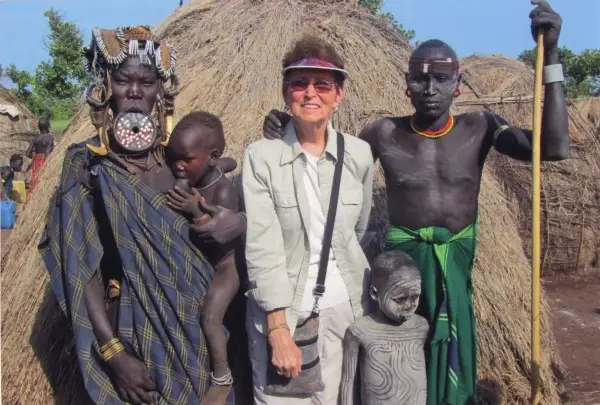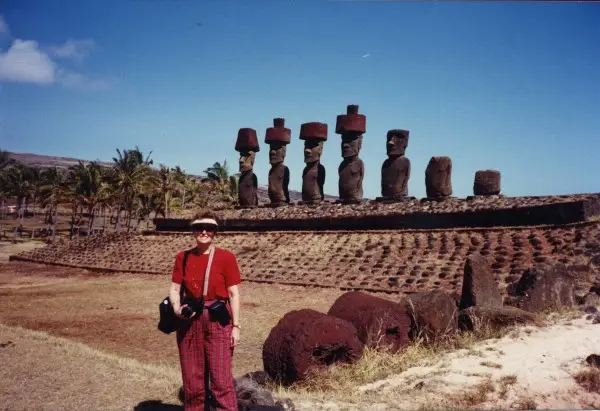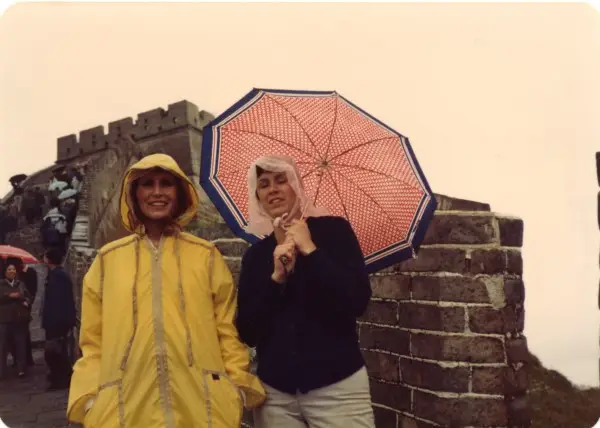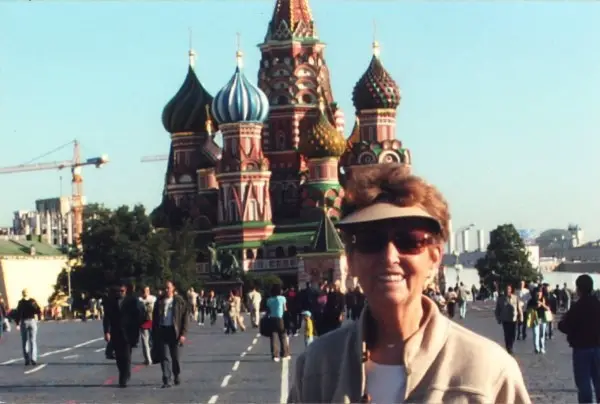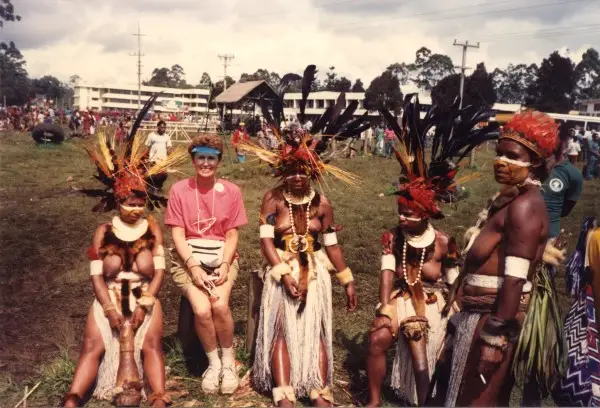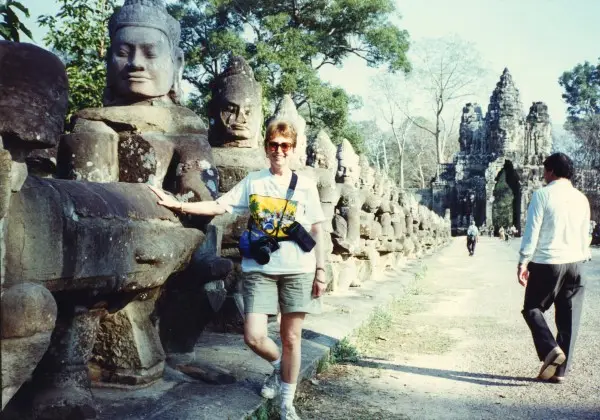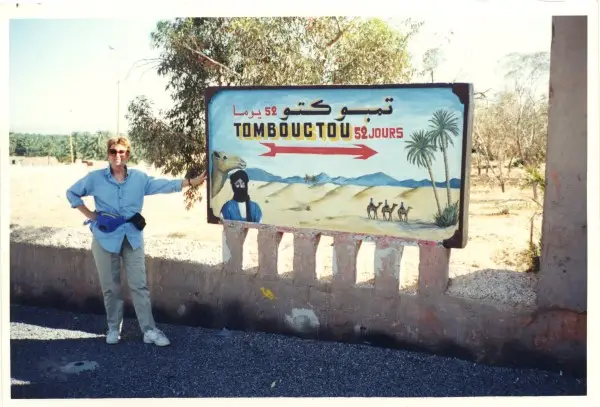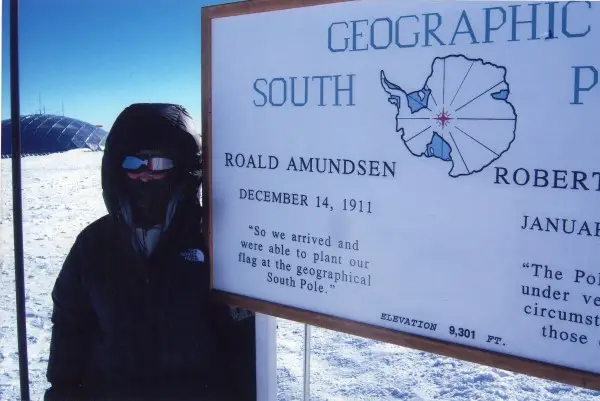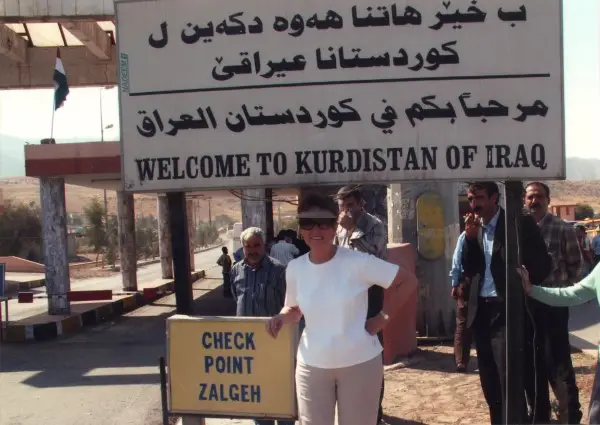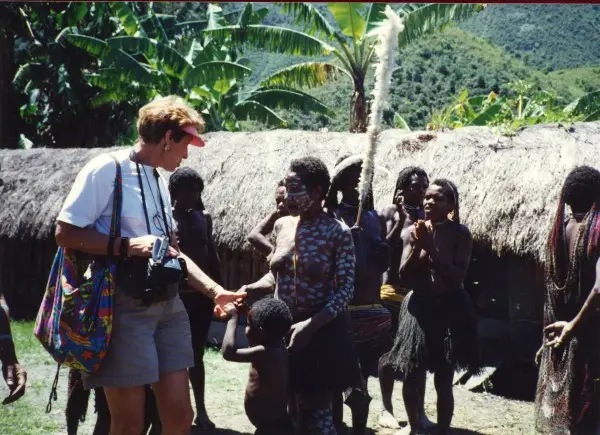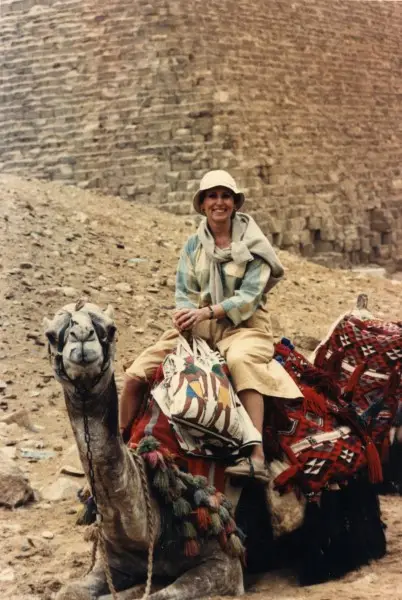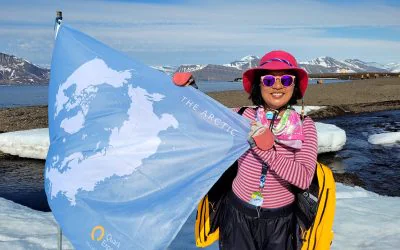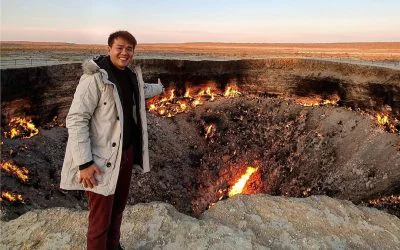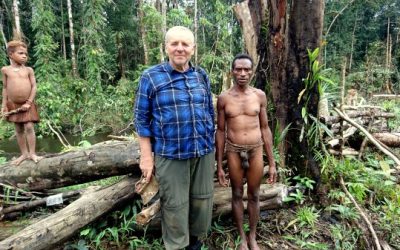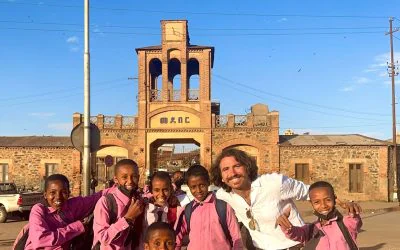For those who are truly in the know, Audrey Walsworth needs no introduction. In 2005, she completed every UN country, becoming the first woman we know of to do so, and she topped this feat by completing the then TCC list in 2009. Taking her first trip abroad at the age of 35, and her second one a decade later, Audrey is certainly a ‘less obvious’ traveller whose curiosity and desire to explore ultimately lead her to become travel community royalty. We are incredibly happy to host her today and to see her as part of the NomadMania community.
Audrey, tell us a little about your early years and your life before you became a traveller.
I was born on June 12, 1934 in Chicago and lived there until I left for college and journalism school at the University of Missouri, Columbia. It was there that I met Don and after graduation and marriage moved to Marceline, Missouri which is his hometown and the location of the family business.
After college I settled into married life and quickly had a son, Ed and then a daughter, Lynn, and then another son, Don, Jr. in the span of four years. So, I was very busy with children and supporting my husband while he was building his business. It was ten years later that I had a chance to go to Lithuania with my mother and aunt. All four of my grandparents immigrated from there in the early 1900’s and I was naturally curious about where they had come from.
How did you start travelling? And what was the reaction of your family and friends?
Suddenly there was a small ease of the cold war and the USSR allowed small groups to visit Lithuania. Since other people in my family were still fluent in the language and I no longer was, it seemed like the chance of a lifetime. So in 1969, I took my first trip abroad, to Moscow and then Lithuania. The trip was only a week, but was very eventful and my first picture of how life was in other parts of the world.
Still it was not enough to get me started seeking out the rest of the world. That happened when I went to China in 1980, after it had just opened up. Wow! No cars, bicycles everywhere, no one wearing anything but Mao jackets. Now I started thinking about how wonderful it would be to travel elsewhere.
Luckily my husband was on my side even though he wanted nothing to do with it, except pay for it. He does not like long flights, worrying about what he is eating, or having a problem talking to someone who does not speak English. He is proud of my sense of adventure. My friends at first were amazed at where I was going and why I wanted to go there. Now, after all these years, they are blase about it. And cannot say that I was ever afraid of where I was going and once I picked the next trip, never hesitated. After all, once the goal was set, there it was, to be accomplished.
Of your travel experiences, can you give us a few that had a profound effect on you.
The one that comes to mind first is that visit to Moscow and Lithuania in 1969. At that point I had never been out of the country and so you can imagine what an experience it was. Everything about it was new to me. Most of all was the feeling of utter lack of control. Everything was dictated by the USSR government.
The tour that I was with included my mother and aunt. The three of us had no idea what to expect. All we knew for sure was that we would land in Moscow. From there we would spend just one night but we did not know in which hotel. In fact,control was so complete that we really did not know anything about the details of the trip. Just that we would eventually get to Lithuania. We never knew which flights we would be on, what time we would leave until the last minute. We were to be ready always for what ever was set for us to do. The list of what we could and could not take was unbelievable. We were allowed 2 headscarves, 3 sweaters, 1 fur coat, but only for personal use, 2 pair of blue jeans to name some okay things. Material could not be taken in, would be confiscated, you could only have one religious article, one tape recorder and only enough clothing for the duration of the trip.
We were on Aeroflot and that in itself was a new experience. The stewardesses were unfriendly, unhelpful and basically bored. The plane landed in Moscow in the late evening, well after dark. We disembarked, no one helped anyone, it was a long walk to the terminal and we had to bring our own bags.
Customs was another shock, all the bags had to be opened and checked. They even put their hands in any pockets in the clothing. Hardly anyone spoke and of course, there were no smiles.
When we got ready to fly to Vilnius we were taken to the airport and had to wait in a waiting room with very few seats, so most of us had to sit on the floor for several hours. Incidentally, our passports were taken away from us and not given back until we flew home.
My Lithuanian relatives were there to greet us and we were treated by them as if we were visiting royalty. The contrast between their lives and ours was unreal. We must have looked like movie stars to them as austerely dressed as they were. The three things that astounded them were that we live in houses, not apartments, that none of us worked and most astounding of all, that with our passports we could go anywhere we wanted. They could not even go to the next village without a permit.
I could go on and on, but you can see why when it was all over, I was so grateful to live in the “Land of the Free.”
I went from one profound experience to another 11 years later in 1980 when I went to China very soon after it opened to the rest of the world. My husband just casually asked me one evening if there was any place I would like to go if I could. Of course, the answer was China. Surprisingly, in the next couple of days there was an article in the Columbia, Missouri, paper about a trip to China that was sponsored by the Geography Dept.of the University of Missouri, our alma mater. They were looking for interested participants. It was called the “Edgar Snow” trip because of his connection to the university and the fact that he had written the book that Mao felt was the most accurate depiction of his takeover of the country. Because of this, the trip was well received in China and resulted in many special events, like extraordinary access to the Forbidden City, special dinner in the Hall of the People, the Summer Palace and places to stay that had never been opened before. One place was Madame Chiang Kai Shek’s summer palace where we were served plum juice and spent the night.
We first spent a couple of days in Hong Kong. We then took the train to Guangzhou and all of a sudden it was obvious, Hong Kong and China were not the same thing. Immediately after crossing the border, the Red police boarded and locked all the train doors.
Even riding through the country side one could see that there were a lot of people, and that all of the land is put to use. There were terraces everywhere, even places where it didn’t look like anything could be planted. When we reached Canton It was a real culture shock, thousands and thousands of people, walking, on bicycles, in buses, no cars. All dressed alike in Mao coats and slacks in dark blue, grey or green. The sameness was startling. The streets were very dark because there were no street lights. We visited the Canton Trade Fair and were astounded by how far behind ours the technology is. They were still doing many things by hand.
The flight to Peking (Beijing) was another culture shock. On Air China, the plane started down the runway before all the passengers were seated. There were no safety regulations and we were told to put all our luggage in the overhead bins. Some of it fell off during the flight. When we landed the airport was huge, with no one in it, obviously built for the future. We were the only ones in the airport aside from the employees in a city of 9 million, at that time.
Culturally, the differences in their education system, medical facilities and attitude were there for us all to see. They emphasised the “5 Loves”, country, people, work, science and public propriety. So much has changed, they have come a long way in these 50 some years. However, they still live within arms’ length of someone else.
Which countries really surprised you, positively or negatively, based on what you had expected beforehand?
When thinking about countries that surprised me I would have to mention Laos and Burma, I had thought they would be somewhat like carbon copies of Thailand, but they certainly were not. Each of them has a definite flavor of their own and I found them to be uniquely lovely and fascinating.
On the other side, I was very disappointed in Guyana, Suriname and French Guiana. The capital cities were dreadful, especially Georgetown, Guyana. The countrysides were lovely in places, but not enough to offset the poor impression the cities made. Do not care to ever go back there.
To what extent do you feel that being from the United States has shaped the way you viewed the world? And how did people around the world react to you as an American woman travelling alone?
I don’t think that being from the United States shaped my view of the world in one way or another. Mine was just an innate curiosity, and I think that carried over into an openness that was a part of all my travels. People were often surprised to find a woman traveling alone, especially in some countries. They were close to shocked when I showed up in Yemen in 2005. There were times in some countries where I was treated like a hot potato, but eventually people bounced back and I have to say always treated me well. In fact sometimes I got special treatment since I was alone and they worried about me. Those times were special to me, showed the kindness of the human spirit and how we all want to look out for each other. In Bangladesh the waiter kept fussing around me when he realized no one was going to join me. I had the feeling that if someone had approached me, he would have run them off. This went on each meal for the four days I was there.
My travels were not always alone, I did travel with groups, individual friends, one friend in particular. I took my daughter on a few trips and each summer took all of my 7 grandchildren on a trip from the time they were 10 until a few years ago when college or work kept them tied up and not able to go. Those were very special trips for me.
You completed your final UN country in 2005. Have you been travelling a lot since then?
After I completed the UN list in Timor in 2005, I took 4 more trips. Two of them were with grandchildren, took 4 to Belize and 3 to Italy and San Marino. Same year after that went to Iraq, Afghanistan, Nakhchivan, and Bangladesh, then a trip to Eritrea, Djibouti, Somalia, Somaliland, Ethiopia with a group and then by myself to Yemen.
There was no plan to quit after completing the UN list. After all I was also working on the Travelers Century Club (TCC) list and there were still many more to go on that. In 2006,11 trips, 2007, 9 trips, 2008 8 trips, 2009 9 trips and the last one that year was Wake Island where I completed the TCC list for the first time. But even then I did not quit, just started repeating places that I had enjoyed and wanted to see more. So I went on 37 more trips until this year when Covid 19 clipped everyone’s wings.
Compared to the 1980s and 1990s, when you did a lot of travel, how is travel different today?
There is no way to compare the travel in the 1980’s and 1990’s to today. Security is the biggest change I would say along with the number of people traveling. There were times before when planes would be half empty. There were not the crowds that you see now at Angkor Wat and Machu Picchu, etc. and many countries were not as commercialized as they are today. How I wish for the Vietnam that was in 1992, a lovely country coming out of the war, serene at last, friendly with wonderful people and food. For years I said it was my favorite country, that it had everything, but no more. Have been back 3 more times and each time more commercialized then the last. Same thing with China, and all the other so called emerging nations. Still wonderful places, but not the same to someone that saw then early on.
To what extent do you think the current development of social media and many travel sites/communities are a good or a bad thing for travel?
Generally, I think that social media can be very helpful for travelers, since it provides info and ratings. But I also think that there are things that should be looked into. Like, who is providing the info, is it someone that you feel knows what they are talking about. Have they really experienced enough to make a fair and justified evaluation?
Personally, for myself, I am not a huge fan of social media. Am not on Facebook and feel that it can be source of much damage. So maybe, I am not a good person to pass a judgment on how valuable it can be.
Three years ago, a young woman traveller claimed to be the first woman to do all the countries in the world, disregarding yourself as well as other notable women who achieved the feat after you. If you could meet her face to face, what would you tell her?
As concerns Cassie De Pecol, I have had a little contact with her through someone else. When questioned about whether she truly did this, she is very defensive and snarky. So, I have left it at that. She knows what she did and didn’t do and I know what I have done and that is all there is to it as far as I am concerned.
Do you have any regrets in terms of your travels? If you could change one thing, what would it be?
My travel regrets are just that there are places that I wish that I had spent more time, but reversely, there are places where I had to spend too much time. Places that only had one flight a week for example.
Finally our signature question. If you could invite any four people to dinner (say, from any period in human history, assume they are all still alive), who would be your guests and why?
My four dinner guests would be Jesus, Churchill, Cleopatra and DaVinci. This was a hard one, spent a lot of time thinking about it.
